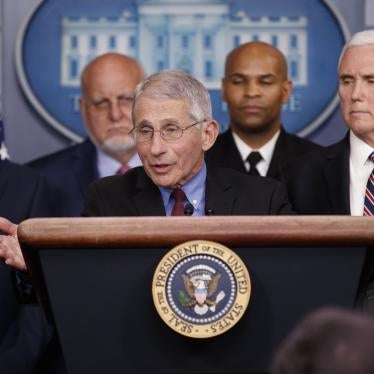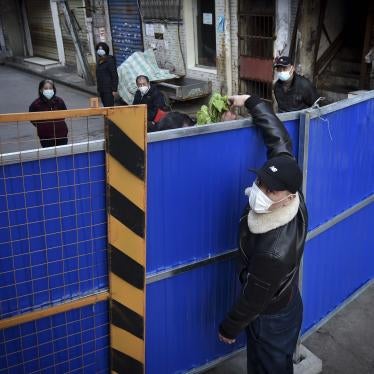March 13, 2020
- Early Release : Eliminate overcrowding to create the space and infrastructure that will be needed to care for the sick by immediately releasing (1) any and all individuals whose release will not pose a serious physical safety risk to the community and (2) any and all individuals with 30 days or less of their sentence remaining. In addition, immediately accelerate the release of all remaining individuals by 90 days and increase AB109 early release credits. Each jail facility should be under capacity to allow for proper adherence to the Center for Disease Control’s (CDC) recommendations regarding social distancing, sanitation, cleaning, and disinfecting.
- Cite and Release : Cite and release all those who are eligible pursuant to Penal Code Section 853.6, rather than booking them and potentially introducing COVID-19 into the jail system. Reducing these unnecessary incarcerations would reduce the risk of transmitting a virus between the facilities -- jails -- and the community, and vice versa.
- Immediately suspend arrests and/or booking of individuals suspected of technical parole or probation violation. Technical violations are behaviors that would not warrant incarceration for people not on parole or probation. Again, reducing these unnecessary
- incarcerations would reduce the risk of transmitting a virus between the facilities -- jails -- and the community, and vice versa.
- The LASD, DHS, and CHS need to address care inside : In addition to taking steps to immediately address overcrowding, all people who remain in custody should be cared for. As was noted by the ACLU of Southern California’s letter to Sheriff Villanueva on March 12, 2020 , information released by the LASD thus far does not provide the exact steps that will be taken to prevent infections, nor the steps being planned to care for those who become sick. A more thorough preparation plan that addresses the eight concerns identified by the ACLU of Southern California needs to be developed and made available to the public. This preparation plan should include the frequent and deeper cleaning of transportation vehicles, facilities, clothing, and bedding in all shared and private spaces, as well as the use of more effective disinfectants. Additionally, there should be an increase in transportation vehicles to allow for appropriate social distancing.
- The LASD, DHS, and CHS need to immediately develop and implement testing protocols for all people who live, work and visit inside jails : There is currently no accurate reporting on whether or not COVID-19 is present inside L.A. County jails. In order to accurately assess the presence of COVID-19 and prevent infection, LASD must immediately develop protocols for screening / testing of staff, people in custody and visitors. LASD must publish departmental COVID-19 protocols and provide regular online updates for the public, officials and media on the impact of COVID-19 on people inside the jails, including data on both incarcerated people and staff. LASD should allocate funding from its current budget to implement this protocol and supply sufficient testing kits.
- The Sheriff’s Department should work with the Department of Health Services-Correctional Health Services to immediately identify medically vulnerable people in the general population and specifically in the pre-trial population, then coordinate with the District Attorney’s Office to petition the court for their immediate release. This includes but is not limited to, people age 55 and older, pregnant people, people with chronic lung conditions such as COPD, hepatitis C, HIV, diabetes mellitus, hypertension, and/or cardiac disease who will be most vulnerable to COVID-19 infection.
- Reinstate access to visiting and guarantee access to phone calls, mail and court hearings : Incarcerated people already experience prolonged isolation from their families and communities. Fear of exposure should not be justification to further isolate incarcerated people, nor keep them from their right to due process. LASD should provide safe and accessible no contact visitation options to families and defense council, such as no-cost virtual visitation and visitation behind glass, continue to provide access to mail, and institute free phone calls to provide reassurance to families worried about their loved ones inside and increase access to defense council. In the interest of justice, incarcerated people should continue to have access to their court hearings.
- Extend paid sick leave to all employees , including those with temporary/part-time employment status.
- Eliminate any and all medical co-pays.
- Decline criminal charges whenever possible. Instead, divert individuals to the Department of Health Services , community service providers, and civil courts with return dates that are at least 6 months from the date of alleged incident. For charges not declined, reduce as many as possible to citations or non-warrant, non-arrest charges, with return dates that are at least 6 months from the date of alleged incident.
- Advocate for the release of all medically fragile adults and adults over the age of 55 in the interest of justice, pursuant to Penal Code Section 1170(d)(1) . Jails house large numbers of people with chronic illnesses and complex medical needs, who are more vulnerable to becoming seriously ill and requiring more medical care with COVID-19. And the growing number of older adults in county jails are at higher risk for serious complications from a viral infection like COVID-19. Releasing these vulnerable groups from jail will reduce the need to provide complex medical care or transfers to hospitals when staff will be stretched thin.
- Advocate for the immediate release of anyone within six months of completing their sentence and all individuals charged with an offense that does not involve a serious physical safety risk to the community in the interest of justice, pursuant to Penal Code Section 1170(d)(1) .This includes technical violations of parole or probation regardless of the underlying offense. This will reduce overcrowding as well as the risk of transmitting a virus between the facilities -- jails -- and the community, and vice versa.
- Immediately implement a pretrial policy that requires all prosecutors to advocate for the pretrial release of all individuals, unless there is clear evidence that release would present an unreasonable risk to the physical safety of the community. As was noted in the ACLU of Southern California’s letter to the Superior Court and the District Attorney and Public Defender Offices, on March 12, 2020 , the vast majority of people facing pretrial detention should be allowed to remain in the community. “If held, they will be at substantially higher risk of exposure and serious health consequences, including death.”
- Require prosecutors to provide a public health/COVID-19-informed justification for any actions/requests that would bring folks into courthouses, jails, and prisons. Ensure those justifications are on the record for public scrutiny.
- Refuse to ask the court to issue “failure to appear” warrants or, “bench warrants” and agree to jointly waive the appearance of people who are out-of-custody.
- Work with defense attorneys and courts to ensure that people in custody receive constitutionally-mandated speedy trial.
- Default to noncustodial sentences wherever possible , including resolutions that avoid immigration detention where outbreak potential is highest.
- Extend paid sick leave to all employees , including those with temporary/part-time employment status.
- Default to noncustodial sentences wherever possible, including resolutions that avoid immigration detention where outbreak potential is highest.
- Reduce number of in-person court appearances for non-essential issues and low-level cases. If requested by defense counsel, agree to waive clients’ appearance for status court dates (for people both in and out of custody).
- Decline to issue “failure to appear” warrants or “bench warrants.”
- Cancel all probation, parole, and pretrial meetings ; court-ordered classes; in-person drug testing; collection of court debt; and modify all reporting conditions to phone-reporting.
- Cancel probation or parole revocation hearings based on technical violations upon request of defense counsel and release those held in custody pending hearings on signature bonds.
- Require that prosecutors provide public health/COVID-19-informed justification for any actions/requests that would bring people into courthouses, jails, and prisons. Ensure those justifications are on the record for public scrutiny.
- Heavily consider the significant risk of mortality and spread of COVID-19 inside custodial facilities and follow these guidelines for keeping the community safe, both in and out of jail, when considering bail applications and post-conviction motions to modify sentences.
- Extend paid sick leave to all employee s, including those with temporary/part-time employment status.
- Issue an urgent statemen t explaining why adherence to community demands for immediate COVID-19 related changes to the arrest and detention practices of the Sheriff’s Department, District Attorney’s Office and the Superior Courts is vital for the health and safety of the entire county of Los Angeles.
- Require the development of COVID-19 related protocol plans from all relevant county departments and review the efficacy and adequacy of each plan, and provide daily updates on how county officials are taking measures in providing support to individuals inside.
- Commit to providing vulnerable houseless residents and recently released individuals with safe and sanitary community-based housing alternatives to protect against the spread of COVID-19.
- Give emergency funding to the LA County Public Defenders and Alternate Public Defenders Offices to support getting people out of custody and into housing and support services.
- Institute a moratorium on any housing and services restrictions for people with a history of justice involvement.
- Direct the Office of the CEO to do the following:
- Work with all relevant county departments to identify where emergency testing centers and emergency housing can be established.
- Immediately identify and remove barriers to community based organizations accessing county funding to be able to expand their capacity to deliver services.
- Allocate emergency funding to provide immediate health and human services to address the crisis and support individuals released from custody. Funding should be allocated to implement the following services:
- Sufficient testing kits to all lock-down facilities, community-based treatment and transitional housing centers and county hospitals.
- Drive-through testing locations throughout the county, with particular attention to areas with the highest concentration of houseless, formerly incarcerated and low-income people.
- Emergency housing for individuals who have tested positive for COVID-19 or are at high risk of contraction.
- In-patient and out-patient drug treatment and mental health services.
- Expansion of the Office of Diversion and Reentry to support the transition of vulnerable incarcerated people out of custody and into community based treatment, as well as pretrial individuals with mental health and behavioral health needs.








